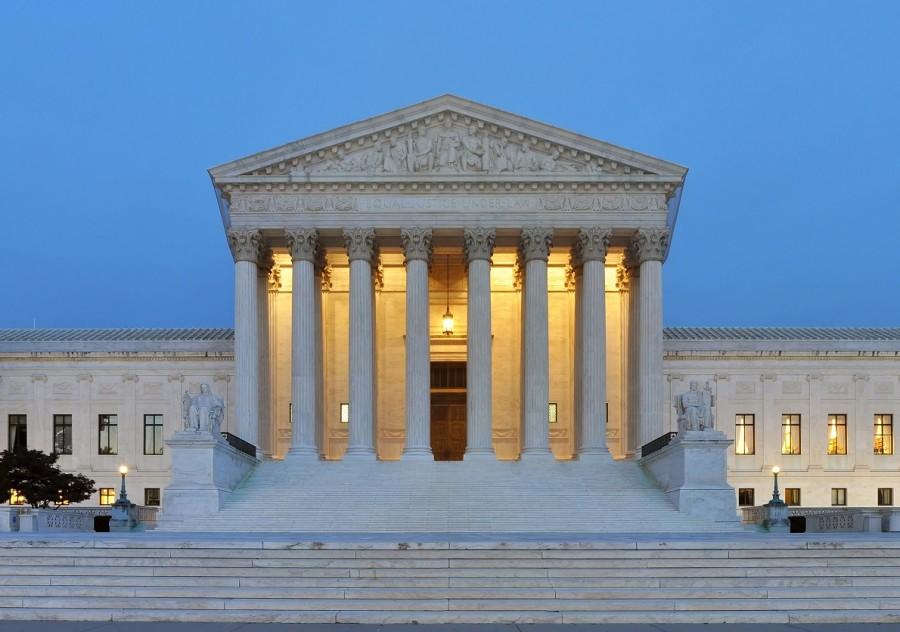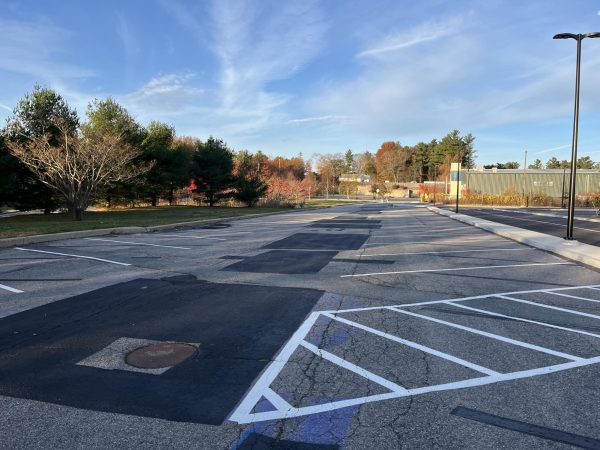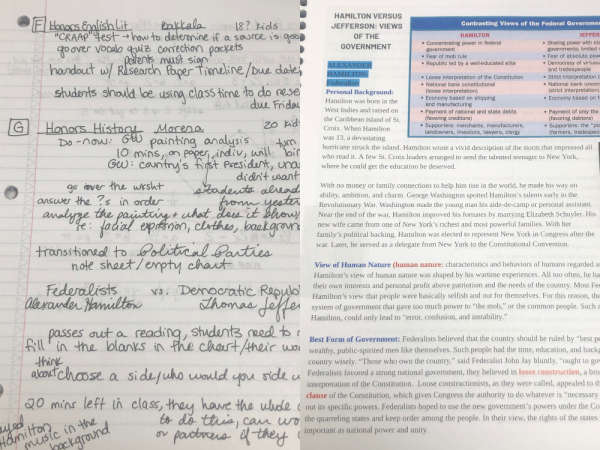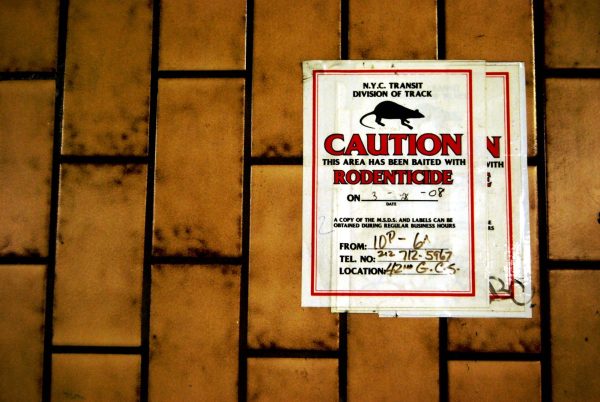Scalia’s death leaves high court in limbo
Filling his seat has become a battle of political wills
Google image/Creative Commons license
The U.S. Supreme Court may go more than a year with only eight members.
The death of U.S. Supreme Court Justice Antonin Scalia on Feb. 13 marked the end of an era.
Regardless of one’s political beliefs, Justice Scalia was an undeniable force during his nearly 30-year tenure, the outspoken intellectual for the court’s conservative wing. He was an “originalist”: a strict interpreter of the U.S. Constitution as it was written by the Founding Fathers.
His nomination to the Supreme Court by President Ronald Reagan in 1986 was met with a unanimous confirmation by the Senate. It was probably the last time the pugnacious judge, the first Italian-American to sit on the high court, failed to create dissent, if not outright controversy.
The vacancy left by his death has led to the biggest controversy in American politics today: whether President Obama should nominate someone to fill his spot or leave the decision to his successor.
“It would be unprecedented in recent history for the Supreme Court to go a year with a vacant seat,” Senate Minority Leader Harry Reid (D-Nev.) was quoted as saying in The Boston Globe. “Failing to fill this vacancy would be a shameful abdication of one of the Senate’s most essential constitutional responsibilities.”
Perhaps not surprisingly, Sen. Reid’s counterpart, Majority Leader Mitch McConnell of Kentucky, vehemently disagreed. He told The New York Times that, while the Constitution gives Mr. Obama the right to nominate someone, “he also has the right to make a different choice. He can let the people decide and make this an actual legacy-building moment rather than just another campaign roadshow.”
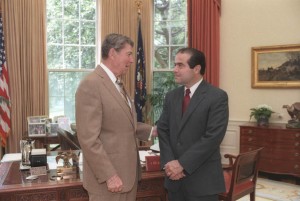
Antonin Scalia, right, was appointed to the Supreme Court by President Ronald Reagan in 1986.
Considering Justice Scalia’s outspoken nature, the current debate may seem apropos. He ruled on several important cases concerning the death penalty, abortion rights, and gun control. Justice Scalia ranks third for the most dissenting opinions written by a single justice, highlighted by his opinion in Obergefell v. Hodges (the right to same-sex marriage).
He also wrote the most concurring opinions in Supreme Court history, a trait that shows that his love for discourse didn’t only apply to dissents.
Perhaps Justice Scalia’s most important opinion, or his most well-known, is the majority opinion he wrote in District of Columbia v. Heller in 2008. In his opinion, Justice Scalia wrote that the Second Amendment protects the individual right to bear arms, radically changing the way that many people view the Second Amendment.
Justice Scalia’s role in the Supreme Court was important not only because of the countless legal documents that he wrote, but also because with him on the court there was a 5-to-4 ratio of conservative judges to liberal judges. As it stands now, liberals and conservatives are split, and the next justice that is confirmed could turn the tide, in a liberal or conservative direction, for years to come.
Senate Republicans are promising that they will not hold any confirmation meetings or hearings for a nominee.
“I don’t see the point in going through the motions, if we know what the outcome is going to be,” Senate Majority Whip John Cornyn of Texas said. “I don’t see the point in […] creating a misleading impression.”
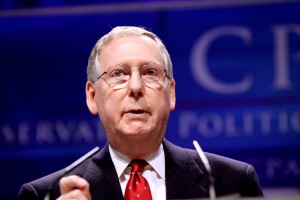
Sen. Majority Leader Mitch McConnell has said the next president should appoint Justice Scalia’s successor.
President Obama has directly addressed Senate Republicans, saying it is their constitutional duty to consider a nominee.
“I plan to fulfill my constitutional responsibilities to nominate a successor in due time,” he said. “There will be plenty of time for me to do so and for the Senate to fulfill its responsibility to give that person a fair hearing and a timely vote.”
Sen. McConnell has indicated he won’t budge from his position.
“I’ve said repeatedly and I’m now confident that my conference agrees that this decision ought to be made by the next president, whoever is elected,” he said.
The debate has naturally extended to the presidential race, with Republican candidates speaking out against filling the vacancy before a new president is elected.
“I think this is a matter of policy, that during a lame-duck period we should not be confirming a Supreme Court nomination,” Sen. Ted Cruz of Texas said.
Sen. Cruz’s interpretation of Mr. Obama’s “lame duck” status also has received scrutiny, as this period has traditionally been viewed as the time between the election of a president-elect and the president-elect’s inauguration.
Although Mr. Obama has yet to nominate anyone, there has been plenty of speculation concerning his potential short list of names. Indian-American Sri Srinivasan and Native American Diane Humetewa would be the first of their respective ethnicities to serve on the court.
Mr. Srinivasan, it should be noted, was confirmed by the Senate to the U.S. Court of Appeals for the District of Columbia Circuit by a 97-0 vote in 2013.
If Senate Republicans get their way and the next president fills Justice Scalia’s seat, then they are gambling that former Secretary of State Hillary Clinton or Sen. Bernie Sanders of Vermont—both of whom are considered by many to be more liberal than President Obama—won’t be elected (and that Republicans will maintain control of the Senate) to fill the spot with a more liberal justice than the one Mr. Obama might choose.
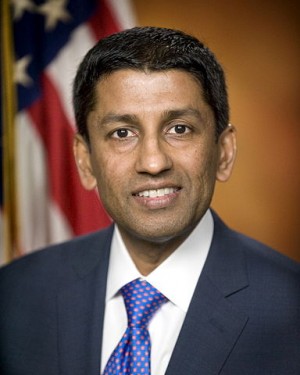
Sri Srinivasan, who would be the first Indian-American justice, has been cited as a possible short-list candidate.
Jessica Bowen, an Advanced Placement Government and Politics teacher at AMSA, explained that the current situation is “exciting politically.” Mrs. Bowen noted that a Supreme Court justice dying on the bench doesn’t happen very often, and that recently justices have been retiring and stepping down. In the case of Justice Scalia, Mrs. Bowen argued that “no matter what happens, it will shift the political balance of the Supreme Court to the left.”
This could make the difference in upcoming Supreme Court cases not only in terms of whether any decision will be a liberal one, but also because it would prevent a tie by bringing the number of Supreme Court justices back to nine.
It shines a bright light on moderate Justice Anthony Kennedy, considered the “swing vote” on the court. Justice Kennedy’s decision may well be the important deciding vote in several pending cases, including Whole Woman’s Health v. Hellerstedt, which will be heard today.
The case is the first abortion-related case to be heard by the Supreme Court in nearly a decade, the last being Gonzales v. Carhart in 2007. Whole Woman’s Health v. Hellerstedt will not address the legality of abortions, but rather investigate the legality of a Texas law which requires abortion doctors to be affiliated with nearby hospitals and requires abortions to take place in “surgical ambulatory centers.”
Texas’ Omnibus Abortion Bill HB 2 could lead to the rapid closing of abortion clinics, because the law requires wide hallways for gurney access, 240-square-foot operating rooms, specialized ventilation systems, specialized fire and safety features, a locker room and shower for staff, and two janitorial closets, at least one of which must be equipped with a faucet and drain.
Abortion clinics unable to meet these requirements would be forced to close.
According to The New York Times, only five abortion clinics met the standards when the bill was signed into law in 2013. Clinics had until September of 2014 to meet the standard, a deadline that was appealed.
According to NPR, two dozen states have passed laws similar to Texas’ bill.
The case will seek to answer whether the state’s “promotion of women’s health” places an “undue burden” on women’s right to abortion.
Undue burden was a concept first solidified in Planned Parenthood v. Casey, in which it was defined as a “substantial obstacle in the path of a woman seeking an abortion before the fetus attains viability.”
Justice Kennedy has experience with discourse regarding undue burden, as he wrote the majority opinion in Gonzales v. Carhart, which dealt with a ban on so-called “partial-birth abortion” and which specifically addressed undue burden.
His vote will be particularly influential now that the court only has eight judges, as any 4-4 tie will let previous lower-court decisions stand. It will highlight the fact that the longer the vacancy on the high court lasts, the bigger that hole looms.
Correction: The Supreme Court decision regarding Second Amendment rights is District of Columbia v. Heller, not Hellerstedt.

Alyana has always had a passion for keeping up with current events, sharing her opinions and mindset, and contributing to a group effort. Her twin sister...

